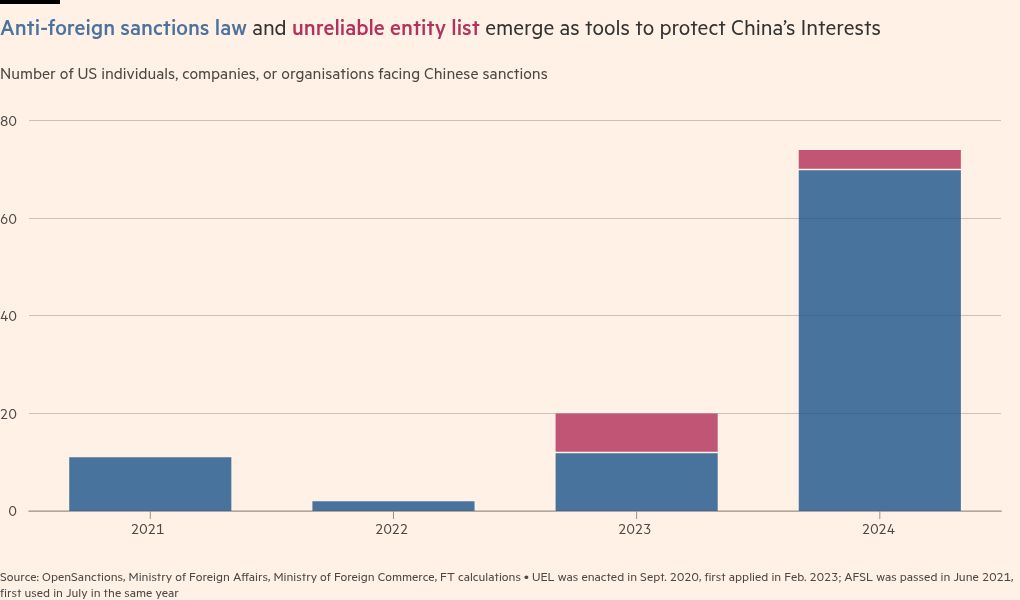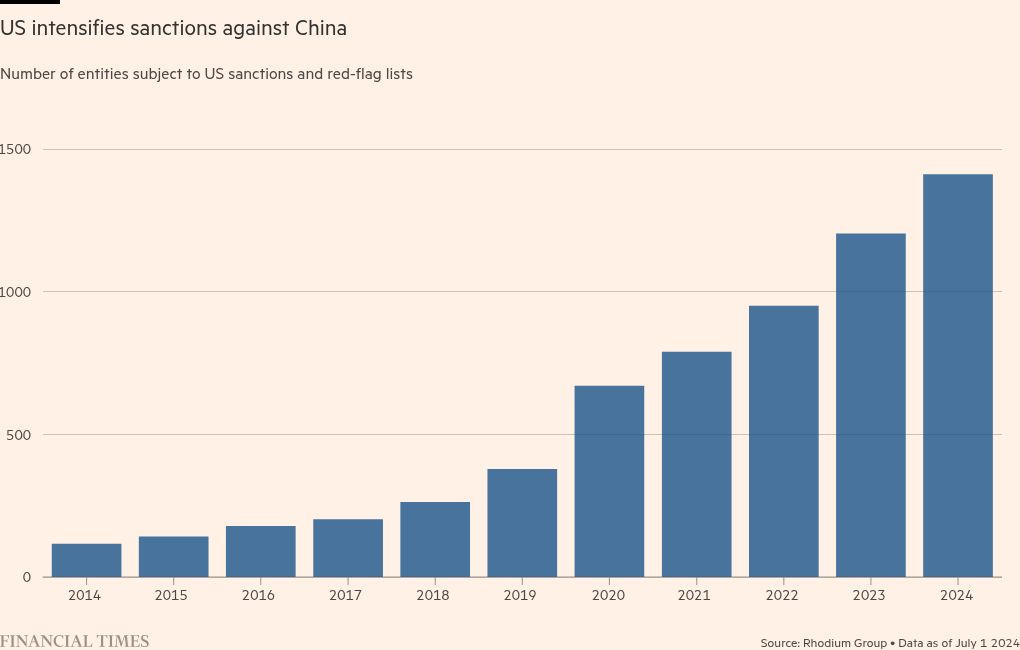China has prepared powerful countermeasures to retaliate against US companies if president-elect Donald Trump reignites a smouldering trade war between the world’s two biggest economies, according to Beijing advisers and international risk analysts.
Chinese leader Xi Jinping’s government was caught off-guard by Trump’s 2016 election victory and the subsequent imposition of higher tariffs, tighter controls over investments and sanctions on Chinese companies.
But while China’s fragile economic outlook has since made it more vulnerable to US pressure, Beijing has introduced sweeping new laws over the past eight years that allow it to blacklist foreign companies, impose its own sanctions and cut American access to crucial supply chains.
“This is a two-way process. China will of course try to engage with President Trump in whatever way, try to negotiate,” said Wang Dong, executive director of Peking University’s Institute for Global Cooperation and Understanding. “But if, as happened in 2018, nothing can be achieved through talks and we have to fight, we will resolutely defend China’s rights and interests.”
President Joe Biden maintained most of his predecessor’s measures against China, but Trump has already signalled an even tougher stance by appointing China hawks to important roles.
China now has at its disposal an “anti-foreign sanctions law” that allows it to counter measures taken by other countries and an “unreliable entity list” for foreign companies that it deems to have undermined its national interests. An expanded export control law means Beijing can also weaponise its global dominance of the supply of dozens of resources such as rare earths and lithium that are crucial to modern technologies.

Andrew Gilholm, head of China analysis at consultancy Control Risks, said many underestimated the damage Beijing could inflict on US interests.
Gilholm pointed to “warning shots” fired in recent months. These included sanctions imposed on Skydio, the biggest US drone maker and a supplier to Ukraine’s military, that ban Chinese groups from providing the company with critical components.
Beijing has also threatened to include PVH, whose brands include Calvin Klein and Tommy Hilfiger, on its “unreliables list”, a move that could cut the clothing company’s access to the huge Chinese market.
“This is the tip of the iceberg,” Gilholm said, adding: “I keep telling our clients: ‘You think you’ve priced in geopolitical risk and US-China trade warfare, but you haven’t, because China hasn’t seriously retaliated yet’.”
China is also racing to make its technology and resource supply chains more resistant to disruption from US sanctions while expanding trade with countries less aligned to Washington.
From Beijing’s perspective, while relations with the US were more stable towards the end of Biden’s presidency, the outgoing administration’s policies had largely continued in the same vein as in Trump’s first term.
“Everyone was already expecting the worst, so there won’t be any surprises. Everybody is ready,” said Wang Chong, a foreign policy expert at Zhejiang International Studies University.

Still, China cannot lightly dismiss Trump’s campaign-trail threat to impose blanket tariffs of more than 60 per cent on all Chinese imports, given slowing economic growth, weak confidence among consumers and businesses and historically high youth unemployment.
Gong Jiong, professor at Beijing’s University of International Business and Economics, said that in the event of negotiations, he expected China to be open to more direct investment in US manufacturing or to moving more manufacturing to countries Washington found acceptable.
China has been struggling to boost the economy amid doubts about its ability to hit this year’s official growth target of around 5 per cent, one of its lowest targets in decades.
A former US trade official, who asked not to be named because of involvement in active US-China disputes, said Beijing had been surgical in using the “arrows” in its quiver, wary of further eroding weak international investment sentiment.
“That constraint is still there and that internal tension in China still exists, but if there are 60 per cent tariffs or real hawkish intent by the Trump administration, then that could change,” the former official said.

Joe Mazur, a US-China trade analyst with Trivium, a Beijing consultancy, said Trump’s wider “protectionist streak” might work in China’s favour. The president-elect has pledged to impose tariffs of at least 10 per cent on all imports to the US.
“Should other major economies begin to view the US as an unreliable trade partner, they could seek to cultivate deeper trade ties with China in search of more favourable export markets,” Mazur said.
However, others believe Beijing’s planned countermeasures will risk hurting only Chinese companies and its own economy in the long run.
James Zimmerman, a partner with law firm Loeb & Loeb in Beijing, said the Chinese government might be “wholly unprepared” for a second Trump term, including “all the chaos and lack of diplomacy that will come with it”.
Zimmerman said a key reason why trade tensions could resurface was Beijing’s failure to meet obligations agreed in a 2020 deal with the first Trump administration that called for substantial Chinese purchases of US goods.
The “smart” action from Beijing would be to do whatever it could to prevent further tariffs from being imposed, Zimmerman said.
“The likelihood of an expanded trade war during the US president-elect’s second term is high,” he added.
Additional reporting by Haohsiang Ko in Hong Kong and Wenjie Ding in Beijing
